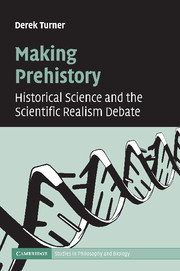Book contents
- Frontmatter
- Contents
- List of figures
- Acknowledgments
- Introduction
- 1 Asymmetries
- 2 The colors of the dinosaurs
- 3 Manipulation matters
- 4 Paleontology's chimeras
- 5 Novel predictions in historical science
- 6 Making prehistory: could the past be socially constructed?
- 7 The natural historical attitude
- 8 Snowball Earth in the balance
- Conclusion
- References
- Index
7 - The natural historical attitude
Published online by Cambridge University Press: 22 September 2009
- Frontmatter
- Contents
- List of figures
- Acknowledgments
- Introduction
- 1 Asymmetries
- 2 The colors of the dinosaurs
- 3 Manipulation matters
- 4 Paleontology's chimeras
- 5 Novel predictions in historical science
- 6 Making prehistory: could the past be socially constructed?
- 7 The natural historical attitude
- 8 Snowball Earth in the balance
- Conclusion
- References
- Index
Summary
What can we do but disdain the fake modesty: “I don't really believe in trilobites; it is just that I structure all my thoughts about the fossil record by accepting that they existed”?
Simon Blackburn (2005, p. 195)Perhaps most people just assume, without thinking much about it, that whatever happened in the past must have happened independently of our thoughts, theories, and conceptual schemes – and independently of what scientists tell us about prehistory. Indeed, it may seem natural to assume that prehistory is not something scientists make. I have tried to show that this assumption, however natural it may seem, is indefensible. There are no good arguments for it at all: no good a priori arguments, because (contrary to what some philosophers have said) there is nothing absurd or crazy about the idea that the past depends on us. And there are no good a posteriori arguments, because the only arguments that realists have produced (for example, Devitt's basic abductive argument) are quite irrelevant to the question whether anything exists or occurs mind-independently.
In philosophy of science today, the leading alternative to realism is the philosophical view that Bas van Fraassen has called constructive empiricism. In this chapter, I present van Fraassen's view and show how that view might apply to historical science. My aim in doing so is to use constructive empiricism as a foil for helping to understand the natural historical attitude.
- Type
- Chapter
- Information
- Making PrehistoryHistorical Science and the Scientific Realism Debate, pp. 163 - 179Publisher: Cambridge University PressPrint publication year: 2007



